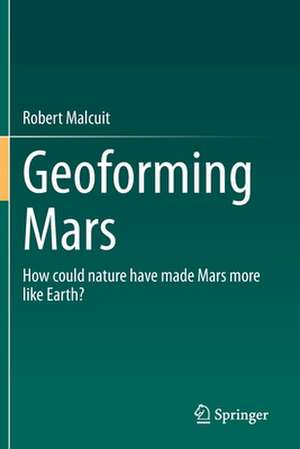Geoforming Mars: How could nature have made Mars more like Earth?
Autor Robert Malcuiten Limba Engleză Paperback – 27 noi 2021
| Toate formatele și edițiile | Preț | Express |
|---|---|---|
| Paperback (1) | 746.15 lei 38-44 zile | |
| Springer International Publishing – 27 noi 2021 | 746.15 lei 38-44 zile | |
| Hardback (1) | 956.81 lei 3-5 săpt. | |
| Springer International Publishing – 26 noi 2020 | 956.81 lei 3-5 săpt. |
Preț: 746.15 lei
Preț vechi: 981.77 lei
-24% Nou
Puncte Express: 1119
Preț estimativ în valută:
142.79€ • 147.51$ • 118.84£
142.79€ • 147.51$ • 118.84£
Carte tipărită la comandă
Livrare economică 21-27 martie
Preluare comenzi: 021 569.72.76
Specificații
ISBN-13: 9783030588786
ISBN-10: 3030588785
Pagini: 420
Ilustrații: XXV, 420 p. 258 illus., 91 illus. in color.
Dimensiuni: 155 x 235 mm
Greutate: 0.62 kg
Ediția:1st ed. 2021
Editura: Springer International Publishing
Colecția Springer
Locul publicării:Cham, Switzerland
ISBN-10: 3030588785
Pagini: 420
Ilustrații: XXV, 420 p. 258 illus., 91 illus. in color.
Dimensiuni: 155 x 235 mm
Greutate: 0.62 kg
Ediția:1st ed. 2021
Editura: Springer International Publishing
Colecția Springer
Locul publicării:Cham, Switzerland
Cuprins
Chapter 1. Introduction.- Chapter 2. The Origin Of The Sun And The Early Evolution Of The Solar System With Special Emphasis On Mars, Asteroids, And Meteorites.- Chapter 3. Models For The Origin Of The Current Martian Satellites As Well As Satellites Of Other Terrestrial Planets.- Chapter 4. A Prograde Gravitational Capture Model For A Sizeable Volcanoid Planetoid (Or Asteroid) For Mars.- Chapter 5. A Retrograde Gravitational Capture Model For A Sizeable Satellite For Mars.- Chapter 6. A History Of A Ruling Paradigm In The Earth And Planetary Sciences That Guided Research For Three Decades: The Giant Impact Model For The Origin Of The Moon And The Origin Of The Earth-Moon System.- Chapter 7. A History Of Lunar Capture Studies: A Chronology Of Events That Eventually Led To A Somewhat Comprehensive Gravitational Lunar Capture Model.- Chapter 8. Comparative Analysis Of The Gravitational Capture Potential For Terrestrial Planets And Planet Neptune As Aids In The Search For Habitable Exoplanets.- Chapter 9. Discussion Of Some Real And/Or Theoretical Effects Of Captured Satellites On Both Terrestrial Planets And Gaseous Planets.- Chapter 10. A Discussion Of Three Major Paradigms In The Earth And Planetary Sciences.
Notă biografică
Dr. Robert Malcuit is Professor Emeritus at Denison University. Though he retired from teaching in 1999, he still pursues research interests in the earth and planetary sciences. His current research pursuits are: (1) gravitational capture potential for planets, (2) explanation of many of the major features of the Earth and Moon, (3) explanation of the major features of planet Venus, (4) explanation of many of the features of the Neptune-Triton system, (5) explanation of several of the unique features of the Earth in terms of a capture origin of the Earth-Moon system and the subsequent evolution of the lunar orbit to the present condition.
Textul de pe ultima copertă
This book offers an exercise in theoretical planetology, presenting five different scenarios to assess the evolution of habitable conditions on Mars to assess planetary terraforming potential and to give insight into the ongoing search for habitable exoplanets. Four of the scenarios involve Martian satellite capture models, in which gravitational capture via tidal deformation and energy dissipation processes are measured to predict a pathway of biological evolution, while the fifth scenario analyzes the possible model that led to the Mars that we have today (i.e. with no life forms). In ten chapters, readers will learn how a Mars-like terrestrial planet can be transformed into a habitable planet, and what conditions must be assessed when searching for exoplanets in a star-centered orbit to support life. The book is intended for planetologists, and general enthusiasts of planetary evolution and our solar system.
Caracteristici
Presents theoretical scenarios for the evolution of habitable conditions on Mars Offers an exercise in theoretical planetology to help understand the origin of life in our solar system Geared towards scientists and general enthusiasts of planetary evolution and habitable planets
